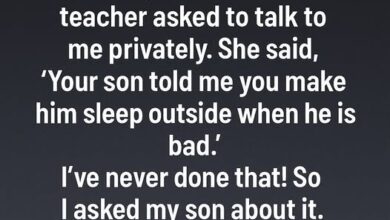
My Ex-Husband Took the House, the Car, and All Our Money in the Divorce, He Never Saw the Twist That Was Waiting for Him
wide, polished grin I’d once mistaken for charm — and rested his hand on the stack of legal documents that handed him everything he’d fought for: the house, the cars, the accounts, even the furniture we’d chosen back when “forever” still meant something.
On paper, I was the picture of loss.
I zipped my bag, stood up, and laughed. Not loud — just enough for him to notice. The bailiff glanced over. James thought he’d won. He had no idea he’d just sentenced himself to his own downfall.
We met ten years ago, back when I still believed ambition was attractive. He was all slick words and borrowed confidence, spinning promises of the life he’d one day “build for us.” A house with white columns. Cars lined up like trophies. Lavish vacations that would make friends jealous.
I mistook his hunger for drive. I told myself love would ground him, mature him, make him real.
It didn’t.
Every promotion became a new purchase. Every raise turned into a bigger show. Dinners, suits, watches — all performances for people whose names he couldn’t remember. He loved two things above all else: mirrors and spectators.
He dressed me like a prop, draped in labels I never asked for, as if my worth existed to reflect his success.
But the one thing he never noticed — the quiet variable in his empire of control — was my mother.
We couldn’t afford the down payment on the house he wanted, not with his spending habits. My mother stepped in, wrote the check, and asked for only one thing in return: to live in the downstairs suite.
He agreed instantly. “She’s quiet,” he said. “As long as I get the house, I don’t care.”
He forgot that sentence the moment the keys hit his hand.
My mother moved in and folded herself into the background — the kind of woman who made silence feel like company. She cooked, gardened, watched her evening news, and kept to herself. To James, she was another piece of furniture.
Meanwhile, the marriage was rotting under its glossy surface. I packed a bag twice. Both times, he convinced me to stay — first with empty promises, then with quiet threats. When charm stopped working, intimidation took its place.
So I stopped fighting. I went quiet, too — but not defeated. I learned something about men like James: you can’t argue with someone who confuses domination for love. You don’t out-yell them. You out-think them.
When the divorce came, I didn’t contest anything. I let him have it all. The house? Take it. The cars? Yours. The accounts? Fine. My lawyer thought I’d lost my mind.
But I knew what he didn’t.
Because buried in the deed — notarized, witnessed, and perfectly legal — was my mother’s life estate. She had the right to live in that house until the day she died. The clause had been filed the day we closed. I’d made sure of it.
The property could change owners a hundred times, but as long as she lived, her key would always fit.
The day after court, James threw a party. He filled “his” house with champagne and shallow compliments. Friends toasted to his “victory” beneath the chandeliers my mother had dusted every week.
She sat quietly in her armchair, sipping tea, watching the show.
By Tuesday, the illusion started to crack.
She cooked meals whose aromas lingered for days. She watched her programs at a volume that rattled the wine glasses. She hosted her bridge club twice a week. The garden — once trimmed within an inch of its life — bloomed wildly with her herbs and vines.
When James told her she needed to move out, she reached for the deed he’d never read, tapped the paragraph with one wrinkled finger, and said gently, “I’ll be here as long as I’m alive, James. You agreed to that.”
He blinked. He had. He just hadn’t cared enough to remember.
I moved into a small apartment across town — one bedroom, plenty of sunlight, and no pretense. It felt like exhaling after years of holding my breath. I started painting again. I worked harder than ever. Without his greed draining every cent, my consulting business flourished. Clients recommended me. My savings grew.
Freedom, it turned out, was highly profitable.
Gossip travels fast in circles that thrive on image. Soon I heard the whispers — the dinners that went silent when my mother turned on her news at six, the contractors who refused to work under the conditions of her “non-evictable residency,” the buyers who backed out when they read the fine print.
The house — his symbol of triumph — had become his prison.
A year later, he tried to sell it. Every offer came in insultingly low, thanks to the clause attached to the property. His ego couldn’t stomach the loss, but his finances couldn’t cover the upkeep.
My mother, meanwhile, was thriving. Her garden was the envy of the neighborhood. She invited the mailman in for cookies. The bridge club expanded. She was, by all accounts, delighted.
I visited her every Sunday. We’d sit among the lavender and thyme she’d planted, sipping iced tea. “Do you regret tying yourself to that house?” I asked once.
She smiled, eyes glinting with quiet mischief. “I didn’t tie myself to it. I tied him.”
And she had.
James had clawed, schemed, and postured his way into a gilded cage — one my mother had furnished with doilies and peace lilies.
Three years later, my life looks nothing like the one I had with him. It’s smaller but richer. My work is stable. My friends are real. My walls are filled with my art instead of his trophies. I travel when I want, rest when I need, and never apologize for taking up space.
James, on the other hand, still lives in the monument to his own arrogance. He can’t sell it. He can’t remodel it. He can’t stand it. His reflection, once his favorite companion, now shows him exactly what he’s become: a man imprisoned by the image he tried to own.
People sometimes ask if I regret giving him everything.
I tell them I didn’t give him anything.
I gave him the freedom to trap himself — the one thing he couldn’t resist.
The house was his prize, his identity, his status symbol. And now it’s the soundstage of his slow unraveling — a daily reminder that victory means nothing when you win the wrong game.
As for me, I didn’t walk away empty-handed. I took what mattered most. My peace. My freedom. My mother.
And the quiet satisfaction of knowing that sometimes, justice doesn’t need to shout. It just needs to let time do its work.
So no — I don’t regret giving him everything.
Because he ended up with nothing of value.
And I ended up with everything he’ll never have: a life that’s mine, laughter that’s real, and a home built on peace instead of pretense.




